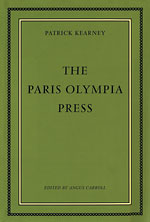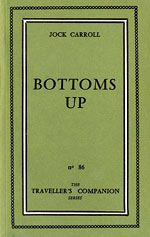The Good, the Bad, and the Obscene
Over the next few years, literally thousands of emails went out to collectors, libraries, and booksellers. No fact was too small to be run down (“Does the tail of the ‘R’ in BEDROOM extend below the text on the title page of your copy of The Bedroom Philosophers?”). At the same time, we continued to make new discoveries: an issue of Merlin published by the Olympia Press; two large, coffee-table books on architecture published by Girodias in 1955 (Sicile Grecque and Saint-Philbert de Tournus). FedEx packages went back and forth between Kearney and Steve Mullins, a leading collector in London, and details were checked with John de St. Jorre, the author of Venus Bound: The Erotic Voyage of the Olympia Press and its Writers.
We were just wrapping up when our luck changed. Through the grapevine we heard Liverpool University Press was planning to publish a book on the Obelisk Press. A quick email to Liverpool resulted in a contract. They thought the Olympia Press bibliography the perfect companion to the Obelisk bibliography.
Our publishing problem solved, we focused on finalizing the manuscript. The bibliography covers hundreds of titles, printings, issues, and variants and every entry had to be double-checked. When the galleys came, we went over every word again. As any author or editor knows, it is impossible to catch every error. Because everyone was focused on the text, no one read the blurb on the back cover, which states Kearney is the author of A History of Gothic Literature, which, of course, should be Erotic Literature.
The Paris Olympia Press finally came out in early 2008, ten years after my visit to Kearney’s house in 1998. For Kearney, it was the culmination of a lifetime of collecting and study, a capstone to his career as an Olympia runner, collector, and ultimately, bibliographer.
Still, there was one last chapter to be written. Having completed his labor of love, Kearney put his collection up for sale at Christie’s. On Thursday, June 12, 2008, Lot No. 206—Kearney’s entire Olympia Press Collection, comprising over 400 volumes (it took eight full pages to describe)—went under the hammer.
The collection was bought by Princeton University Library. It is now part of Princeton’s rare book collection, not to be broken up and sold piece by piece, but kept together as a collection, a focal point for the study of censorship in the twentieth century.
In point of fact, it is only because it was a bibliographer’s collection that it caught the attention of Stephen Ferguson, curator of rare books at Princeton. “When a collection formed by a bibliographer, rather than by a collector, comes on the market, I take special notice,” Ferguson said. “The chief reason is that bibliographers tend to be more aware of what research libraries are interested in supplying to the scholar: variant issues, special issues, items in original condition, publishers’ catalogs and ads, etc., all of which are vital aspects of publishing history.”
Princeton is no newcomer to the history of publishing. The University’s special collections include the archives of G.P. Putnam and Sons, Henry Holt, Charles Scribner’s Sons, D. Van Nostrand, Harper & Brothers, and many others. But the Olympia Press collection represented a special opportunity. “Civil authority versus individual liberty is an on-going conversation,” Ferguson said. “This collection helps document a fascinating chapter in that dialog, and as such can help support important future research.”
As the (self-proclaimed) Publisher Who Defeated Censorship, I think Girodias would have been happy to know that future scholars will use the Olympia Press collection to understand the history of censorship—and the role he played in it.









